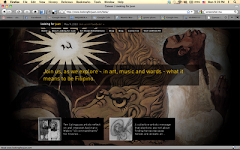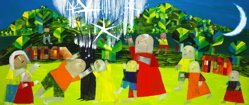For what it's worth, and despite all reports to the contrary, Filipinos are a very happy people. (Check out the article below.)
Then, I just read that two Filipinas will compete in the 2007 Miss Universe Pageant.
Happy na, beautiful pa! What else do we need?!!!
=====================================
Sunday, Feb. 20, 2005
HAPPINESS VIEWPOINT: IT DOESN'T TAKE MUCH
By Alan C. Robles
Is it plausible to think of happiness not as a state of mind or a state of the pocketbook, but as an actual sovereign state? Many surveys lead us down that path. In study after study on national happiness levels, my country, the Philippines, gets unlikely top scores. The World Values Survey published by the University of Michigan last November ranked 82 countries and territories according to feelings of "subjective well-being"�which combined its happiness and "life-satisfaction" scores�and the Philippines had one of the highest ratings in Asia, above far richer locations such as Taiwan, Japan and South Korea. A few years back, a Hong Kong ad agency found the Philippines to be the happiest place among a group that included Thailand, Malaysia, Singapore, Hong Kong, and mainland China.
This is counterintuitive to say the least. We Filipinos live in a country mired in poverty, political conflict, corruption and environmental destruction. On top of that, the Philippines is so regularly battered by typhoons, earthquakes, landslides, floods, volcanic eruptions and other natural catastrophes that it's been ranked the world's most disaster-prone nation by the Brussels-based Center for Research and Epidemiology of Disasters. Yet last Christmas, toward the close of a particularly wretched year, eight out of 10 respondents told a local research firm that they felt "optimistic" about 2005. No tropical depression here, folks.
This cheery outlook doesn't reflect a national state of blissful ignorance. When ACNielsen asked Filipinos to evaluate their lives a few years ago, the respondents were clearheaded enough to give "fair" to "poor" ratings in areas like personal safety, economic well-being and general health� Yet they went on to say they nonetheless considered themselves "very happy."
For Filipinos, happiness isn't material - it's social. We're happiest in a group: family, friends, immediate community, even strangers. I've seen it happen in many airports among perfect strangers: as soon as Philippine travelers drift in, they gravitate toward one another and soon form a boisterous crowd, exchanging jokes and mobile-phone numbers. The awesome range of peculiar Philippine nicknames, a source of amusement to foreigners, are tokens of how much such social groups mean to people: the nicknames are bestowed by family and friends. Some Filipinos use a string of them over the years.
The small group is our bastion against life's unfairness. Hundreds of years of bad government have taught us to expect little from impersonal institutions. We know that our leaders are corrupt, that our country is marred by inequality, that there's plenty of injustice. We just try not to let it get in the way of enjoying life. Filipinos often describe themselves as mababaw ang kaligayahan, or easily amused. There's a dose of self-deprecation there. But let's take it from the national to the personal level. We all know people who aren't easily amused. You rarely think of them as happy.
Filipinos are also known for a pair of connected traits: resilience and self-sufficiency. Instead of counting on government to help us, we help one another. In the U.S., Filipinos are near the top of the list of migrant groups who are least likely to go on welfare. Today, resilience and self-sufficiency have a grim ring. But, once again, take it to the individual level. Do you know many irresilient, dependent people who are happy?
My wife recently met a 43-year-old Filipino named Nestor Castillo, and they started chatting about a proposed government program in the Philippines to give poor people food stamps. Castillo was against it: he didn't believe the politicians and the bureaucrats would be able to pull it off honestly. And yet Castillo could use those stamps. Four years ago, he lost his job as a janitor at the Quezon City Hall. He and his family are now scavengers, living out of a wooden pushcart. This is Castillo's idea of happiness: "Once I found nearly half a fried chicken wrapped in plastic," he told me. "I knew it was still edible because it was still cold, just came from the refrigerator. We had a feast that day." Around the world, people are searching for happiness. For Filipinos, happiness isn't a goal: it's a tool for survival.
Thursday, April 12, 2007
Subscribe to:
Post Comments (Atom)





No comments:
Post a Comment